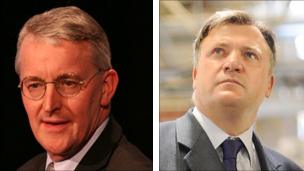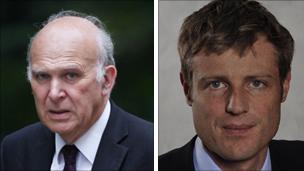Constituency boundary wars: Winners and losers
- Published
MPs are facing the prospect of what one has described as "musical chairs with machetes" as they seek to find a parliamentary seat to contest in 2015.
The biggest re-organisation of the electoral map for a generation by the Boundary Commission will see 50 constituencies abolished and the vast majority reconfigured.
As proposed changes for England and Northern Ireland are announced - and with Scotland and Wales to come - which MPs will have a nervous wait over the next few years and who can relax?
LOSERS
GEORGE OSBORNE
The chancellor's Tatton seat in Cheshire, which he has held since 2001, is set to disappear.
Just under half of its voters would transfer to the existing seat of Macclesfield - held by Tory MP David Rutley - while the remainder move to the newly created seat of Northwich.
Should he contest this seat, Mr Osborne would be likely to win it but his majority may fall.
ED BALLS

Labour heavyweights may be on a collision course
Mr Balls' situation is complicated. His Morley and Outwood constituency in Yorkshire, which he won with less than a 2,000 majority in 2010, would be split into two, under the proposals.
Should he choose to fight the Leeds South and Outwood seat, he could find himself being pitted against shadow Cabinet colleague Hilary Benn, whose existing Leeds Central constituency would be partly folded into the new seat.
If he opts to fight Leeds South West and Morley, he could conceivably come up against one of the rising stars of the party, Rachel Reeves. Either way, he should have no trouble finding a seat but it is a distraction he could probably do without.
SADIQ KHAN/CHUKA UMUNNA/TESSA JOWELL
Labour potentially face a few problems in south London.
Shadow Justice Secretary Sadiq Khan's Tooting seat is set to be divided between Clapham Common and Streatham and Tooting while rising star Chuka Umunna's Streatham seat could be split four ways, with a large chunk of the electorate moving to Streatham and Tooting.
This raises the prospect of them having to go head-to-head for the candidacy.
Mr Umunna could, instead, seek to fight either of the newly created seats of Brixton - maybe up against Vauxhall MP Kate Hoey - or Clapham Common, which might be more difficult to win.
At the same time, Tessa Jowell's Dulwich and West Norwood seat is is set to be carved up, with large parts absorbed into both Streatham and Tooting and Brixton.
Even if the shadow Olympics minister chooses to fight the newly proposed Dulwich and Sydenham seat, this could be harder to hold onto.
LEADING LIB DEMS

Vince Cable vs Zac Goldsmith could be one of the most mouth-watering contests in 2015
The Lib Dems are reportedly unhappy with the shake-up, one forecaster suggesting they risk losing up to 16 seats as a result.
While many of their MPs in the south west should be OK, a host of their biggest names in London and the north of England face potential headaches.
Energy Secretary Chris Huhne's Eastleigh constituency is set to be split into two and although the Eastleigh seat will remain, a big change in its demographic make-up could cause problems for him.
In London, Business Secretary Vince Cable would have to decide whether to fight the newly-created Richmond and Twickenham seat, where he would be up against high-profile Tory MP Zac Goldsmith, or opt for the newly created Teddington and Hanworth seat.
More than 60% of party president Tim Farron's Westmorland and Lonsdale constituency would move into the new constituency of Kendal and Penrith where he would likely face a stern challenge from existing Tory Penrith and Border MP, the former diplomat Rory Stewart.
TORY MINISTERS
Ken Clarke has been an MP since 1970 but his Rushcliffe constituency in Nottinghamshire faces being dismembered by the changes.
The justice secretary would have to decide whether he wants to fight a new Coalville and Keyworth seat or opt to contest Nottingham South and West Bridgford, notionally a narrow Labour constituency.
A handful of younger ministers, who may be eyeing a future Cabinet job, are also under threat.
For example, Olympics minister Hugh Robertson's Faversham seat in Kent is set to be amalgamated into three existing Tory held seats - Maidstone, Canterbury and Tonbridge.
He would also have to go up against these sitting MPs or cast his net wider in search of a constituency.
WINNERS
PARTY LEADERS AND HOME COUNTIES TORIES
Neither David Cameron nor Ed Miliband will have to bat an eyelid, as far as their own prospects for re-election are concerned, as their constituencies have been left untouched by the proposed changes.
Nick Clegg is in a slightly more awkward position as his seat Sheffield Hallam is set to be redesignated as Sheffield West and Penistone and he could face a strong Labour challenge.
A swathe of Tory ministers with safe seats in the south of England are also unaffected, including Theresa May (Maidenhead), Jeremy Hunt (South West Surrey) and Michael Gove (Surrey Heath).
The likes of David Miliband (South Shields) and Harriet Harman (Camberwell and Peckham) will also not be losing any sleep.
MPs in Bristol will be breathing a sigh of relief as it is among the few cities likely to emerge unscathed. Three of four seats would retain their parliamentary boundaries and one change slightly.
However, the real winners may be the handful of Lib Dems whose seats are remaining intact and who will not have the additional pressure of having to defend a new seat as a government MP.
Among them are Julian Huppert (Cambridge), Bob Russell (Colchester), Paul Burstow (Sutton/Cheam), Don Foster (Bath) and Martin Horwood (Cheltenham).
- Published13 September 2011